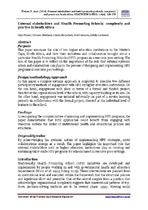| dc.contributor.author | Preiser, Rika | |
| dc.contributor.author | Struthers, Patricia | |
| dc.contributor.author | Mohamed, Suraya | |
| dc.contributor.author | Cameron, Neil | |
| dc.contributor.author | Lawrence, Estelle | |
| dc.date.accessioned | 2014-06-13T07:00:54Z | |
| dc.date.available | 2014-06-13T07:00:54Z | |
| dc.date.issued | 2014 | |
| dc.identifier.citation | Preiser, R., et al. (2014). External stakeholders and health promoting schools: complexity and practice in South Africa. Health Education, 114(4): 260-270 | en_US |
| dc.identifier.issn | 0965-4283 | |
| dc.identifier.uri | http://hdl.handle.net/10566/1097 | |
| dc.description.abstract | Purpose: This paper examines the role of two higher education institutions in the Western Cape, South Africa, and how their initiatives and collaboration brought about a particular Health Promoting Schools (HPS) program in a resource poor setting. The aim of this paper is to reflect on the importance of the role that external systemic actors and stakeholders can play in the process of designing and implementing HPS programs in resource poor settings. Design/methodology/approach: In this paper a complex systems approach is employed to describe two different participatory methods of engagement with HPS by higher education institutions. On the one hand, engagement took place in terms of a formal and funded project, directed at the organizational level of the school, with capacity building as its aim. On the other hand, engagement was initiated informally (as part of a service learning project) via collaboration with the formal project, directed at the individual level of learners in the school. Findings: In recognizing the complex nature of planning and implementing HPS programs, the paper demonstrates that HPS approaches could benefit from engaging with resources outside the ambit of institutional health and educational policies and structures. Originality/value: By acknowledging the systemic nature of implementing HPS strategies, novel collaborations emerge as a result. The paper highlights the important role that external stakeholders such as higher education institutions play in creating and sustaining tailor-made HPS programs for schools based in resource poor settings. | en_US |
| dc.language.iso | en | en_US |
| dc.publisher | Emerald | en_US |
| dc.rights | This is the author final version, copyright Emerald. | |
| dc.source.uri | http://dx.doi.org/10.1108/HE-07-2013-0031 | |
| dc.subject | Complexity | en_US |
| dc.subject | Health promoting schools | en_US |
| dc.subject | Service-learning | en_US |
| dc.subject | External role players | en_US |
| dc.title | External stakeholders and health promoting schools: complexity and practice in South Africa | en_US |
| dc.type | Article | en_US |
| dc.privacy.showsubmitter | false | |
| dc.status.ispeerreviewed | true | |

